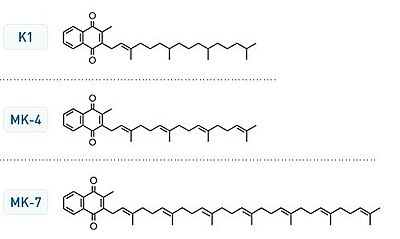Vitamin K, Calcification and GLA Proteins
Vitamin K2 is a potent anti-calcification nutrient via GLA protein carboxylation. Let’s look at this process of calcification and the potency of these various forms of vitamin K2. Then talk about the MK-4 vs Mk-7. Which is best for you? And why?
Vitamin K2 forms
There are currently three forms of vitamin K available. Vitamin K1 (phylloquinone) has been extensively studied. It is not the most potent form. Vitamin K2 is currently available in two forms. MK-4 also known as menaquinone-4 or menatetranone. MK-7 (menaquinone-7) is currently advocated as the most potent form of vitamin K2. You can see in fig 1 that the MK-4 and MK-7 have long “tails” with multiple (poly unsaturated) double bonds. This increases lipid solubility. These are fat soluble as opposed to water vitamins.

So what is the connection between Vitamin K2 and tissue calcification? Why do we petrify as we grow older? Why do we grow stiffer? This is a combination of calcification and glycation. Glycation is secondary to excess carbohydrates, rising hemoglobin A1c (>5.6%), and impaired fasting blood sugars (>100 mg).
Calcification is an impaired healing process. Arterial injuries initiate a process of calcium deposition as a repair mechanism. Calcification is the end result of chronic inflammatory processes. This is a key concept.
How can we prevent or reverse this ossification process?